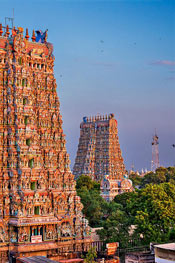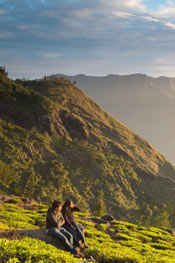Kerala Yoga and Meditation
Yoga not only symbolizes the traditional physical and mental disciplines being practiced since ages in India. Yoga and Meditation symbolizes 'leading life with perfection'. Yoga means the spiritual, physical and psychological development of human beings and societies. With this one can connect his/her soul to the God, and certainly it helps in the spiritual growth.
It has been scientifically proved today that Yoga and Meditation exercises are very effective in healing disorders and for relaxation. Yoga and Meditation together form a wonderful medium for self-analysis and self-realization. Though one can not get instant results, as the practice requires sincere efforts and concentration.
The entire Yoga exercise (Yoga Paddhiti) consists of 8 different stages:
YAMA
This first phase of Yoga-paddhiti involves attaining self-control. It helps you to focus on your intra-personal life. It teaches how to make a control over greed, lying, sensuality, stealing and violence.
NIYAMA
Niyama is a self-exercise to improve self-discipline and self-development within oneself. It is directly connected with purity of body, mind and environment. After learning self-control in Yama, we need to develop the strength of determination to do what we decide to do. Our actions, words and thoughts determine if we are behaving in a harmonious and positive manner to achieve the happiness and satisfaction we strive for. We also need to follow the discipline of contentment in this phase.
ASANA
The third stage is all about practicing postures and physical exercises. Vedas have considered human body as a holy place for the soul. Via practicing Asana (Yogic postures) we can reach to that extent of concentration which is required to attain mental peace and spiritual growth. It is often said that correct body postures, while Yoga Paddhiti, help in absorbing all kinds of positive energies from the five elements of the atmosphere (Air, Water, Fire, Soil and Sky).
PRANAYAMA
This stage is basically a respiratory exercise. It is essential to get a connectivity between your mind, breath and emotions. As the name suggests ("Prana" means LIFE and "Yama" symbolizes FORCE), this exercise also helps in extending life. It delivers best results when practiced in early morning in fresh air as daily Yoga routine. It purifies the mind via regulating vital energy of the body.
PRATYAHARA
Pratyahara is related to studying the inner part of yourself. It is practiced to end up the charm & craze of external world and to direct our attention internally. Pratyahara gives us time to talk to our inner self. It enables us the way that we do not feel any pain while detachment from worldly objects. It explains us, "The source of all existence lies in ourselves. Try to look inward. Find Param-Brahma (the supreme spiritual power) in yourself."
DHARANA
It is the process of going in depth of concentration while raising the attentiveness and concentrating on a single point or object. It can be a candle flame or a mantra like "OM". Dharana is to be practiced only after learning how to control your senses and desires via Pratyahara. Now, once the superior mental power is attained, it needs to be directed on a correct path. For the reason, Dharana is followed by Dhyana (contemplation). Dharana trains our mind to focus on a specific energy centre.
DHYANA
Meditation or Contemplation is the seventh stage of Yoga. It tries to make your concentration level reach Anant (infinity). Meditation is that level of concentration where nothing else exists except you and infinity. No more world, no more thoughts, but this other side of the world exists in you. Your Kundalis (7 power rings in your backbone) start playing their role of absorbing positive energy from the atmosphere.
SAMADHI
When concentration attains its peak, it turns into Samadhi. Earlier the Kundalis were inactive or in sleeping state (Supta), but in this last phase of Yoga, they turn active or Jagrit. Only a few can reach to this level of concentration. Here you can meet that supreme or supernatural power which is described as "Param-Brahma" in our Vedas. It is like merging yourself with God.
Therefore, the entire Yoga and Meditation process starts with self-analysis & self-realization, and ends at this divine state.

 Russian
Russian Spanish
Spanish Frensh
Frensh German
German Italian
Italian Portuguese
Portuguese Deutsch
Deutsch














